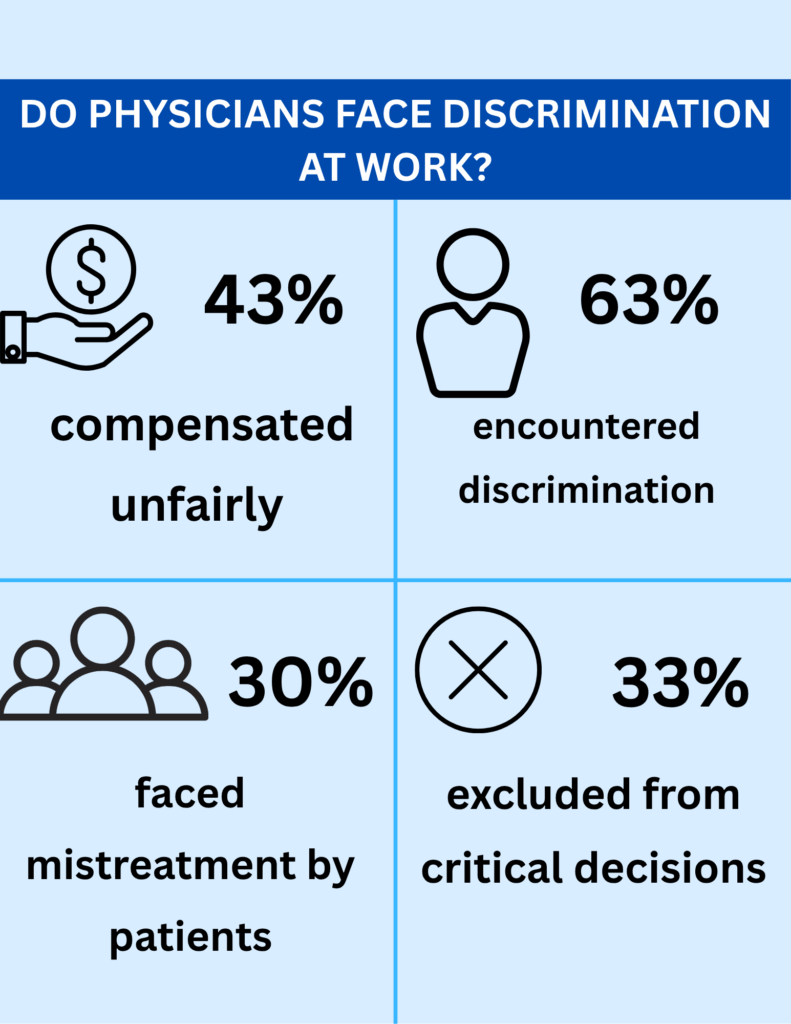Content Highlights
Despite years of education, training, and professional achievement, physicians do face discrimination. In this article, we describe the extent and a case example of physician discrimination.
At Gardner Employment Law, we advocate for physicians and executives facing unlawful discrimination in healthcare settings. To learn more, read on.
What Discriminatory Actions Occur in Healthcare?
For many physicians, bias in the form of unequal pay, unfavorable assignments, or exclusion from leadership opportunities holds them back in their careers. Discrimination may show up through informal evaluations, vague critiques, or decisions about who is promoted or who receives choice assignments.
For example, in Chicalese v. Univ. of Texas Medical Branch, Drs. Cicalese and Rastellini, both born in Italy, claimed discrimination based on national origin. Soon after a new dean arrived, he said things such as, “What are you doing here? You should go back to Italy.”
The dean inflicted numerous adverse actions on them, giving bogus evaluations that were negative, moving Dr. Rastellini to make room for another less qualified researcher, doing a sham investigation of Dr. Cicalese. The lower court dismissed their case. But the appellate court ruled in their favor, stating:
While a close call, we conclude that Cicalese and Rastellini—in claiming UTMB’s various actions against them were motivated by anti-Italian bias—alleged sufficient facts to nudge their claims across the line from conceivable to plausible.
Fortunately, the appellate court sent the case back down to the district court to allow the physicians to present more evidence on their claims. However, cases like this demonstrate how employers may try to mask bias behind neutral-sounding policies.
Racial and Religious Discrimination

Race and religion remain the major factors in physician discrimination. A 2021 Health Affairs study found that 29% of Black physicians and 24% of Hispanic physicians reported workplace discrimination. Muslim doctors have also reported bias related to religious clothing or prayer practices.
These experiences are not simply interpersonal slights. They can affect career trajectories, mental health, and even patient outcomes. We have worked with clients whose race or religion became grounds for exclusion from leadership, denial of promotions, or forced resignation, all under the guise of “reorganization” or “lack of team compatibility.”
The infographic to the right illustrates the more common forms of discrimination physicians face at work. A 2018 study published in the Journal of General Internal Medicine found that 43% of physicians reported feeling unfairly compensated. Additionally, a study published on ResearchGate revealed that 63% of physicians encountered discrimination at work, such as bias in hiring or promotions. Mistreatment by patients is also a growing concern, with 30% of physicians reporting such behavior, including threats, slurs, or refusals of care. Lastly, JAMA Network Open reported that 33% of physicians with disabilities were excluded from important decision-making processes.
These statistics show how workplace discrimination in healthcare is not only real but also deeply systemic, affecting morale, retention, and patient outcomes.
How Can a Physician Prove Discrimination?
Usually, discrimination must be proven by disproving the employer’s reason given for the adverse action. No employer will say, “You’re too old, so we are not renewing your contract.” The physician must offer evidence to show that the reason for what was done is a pretext or a cover-up for the real reason, which is his or her age (or race, religion, etc.)
Discrimination against physicians can be difficult to detect and harder to prove. As illustrated by Drs. Cicalese’s and Rastellini’s case, the discriminatory actions often are masked as legitimate “policy” changes, when actually there is no new policy at all. Although the Equal Employment Opportunity Commission (EEOC) enforces laws against discrimination based on race, religion, age, and other protected traits, enforcement often lags behind lived experience.
What Should Physicians Do If Discriminated Against?
Physicians who suspect discrimination should act quickly. Keep a record of incidents, save copies of emails or evaluations that suggest bias, and report the incidents through HR or your compliance officer. Many times short deadlines can bar your claim if you do not take action.
Obtain legal advice before signing any severance agreement or resignation form. Consulting with experienced counsel can make the difference between a dismissed claim and a successful legal strategy.
At Gardner Employment Law, we help physicians understand their rights and determine how to proceed. In many cases, a well-documented complaint and timely legal intervention can protect a your reputation and career.
Know Your Rights And Enforce Them
Discrimination is not just something to “deal with.” It’s illegal. And for physicians, allowing it to go unchecked can have long-lasting professional and personal consequences.
If you believe your race, religion, age, gender, national origin, or disability is affecting how you’re treated at work, contact our team to explore your options.

